人教部编版初中英语中考78个易混易错单词短语句型梳理
- 格式:doc
- 大小:65.50 KB
- 文档页数:17
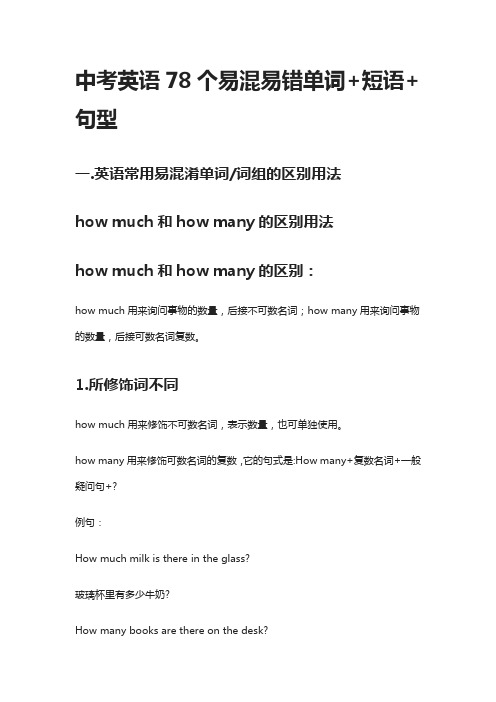
中考英语78个易混易错单词+短语+句型
一.英语常用易混淆单词/词组的区别用法
how much和how many的区别用法
how much和how many的区别:
how much用来询问事物的数量,后接不可数名词;how many用来询问事物的数量,后接可数名词复数。
1.所修饰词不同
how much用来修饰不可数名词,表示数量,也可单独使用。
how many用来修饰可数名词的复数,它的句式是:How many+复数名词+一般疑问句+?
例句:
How much milk is there in the glass?
玻璃杯里有多少牛奶?
How many books are there on the desk?
有多少本书在桌子上?
2.用法不同
How much 表示多少钱,用来问价格。
例句:
How much is this dress?
这个连衣裙多少钱?
How many 表示多少,用来问数量。
例句:
How many apples do you have?
你有多少苹果?
in和on的区别用法:
当我们表示某些东西被其他东西所包围时使用“in”这个词。而“on”用于描述物体被放置在其他物体上方或外部的情况。in可表时间,表地点,表手段、方法、材料。on表示时间、地点、方位等。
1.意思不同
in:prep.在 ... 里;在 ... 地方;在 ... 期间
on:prep.在 ... 之上
2.用法不同
in:in着重一段时间的过程,常用于重复动作或延续动作。in表示从现在时间算起推移到将来的一段时间之后,一般与将来时态连用。

vocabulary n. 词汇(可数名词)
word n. 单词;话语
aloud adv. 出声地;大声地
(无比较级,反义词:quietly;silently)loudly adv.高声地;吵闹地
loud adv.响亮地
adj. 喧闹的; 响亮的
pronounce vt. 拼读;发音
pronunciation n. 发音法;拼读法
specific adj. 明确的;具体的
specifi cally adv. 明确地;具体地
special adj. 特殊的;特别的
specially adv. 专门地;特别地
especially adv. 特别;尤其;格外
particular adj. 非一般的;特别的;特殊的particularly adv. 尤其;特别地;特殊地
memorize vt. 记起来;熟记;回忆起memorization n. 记忆;回忆
gramm ar n. 语法
grammatically adv. 语法地;从语法角度来说,
add A to B 把A添加/补充到B中
add up to + 数量总计达到…
spoken English 英语口语
make a mistake = make mistakes
by mistake错误地
by accident 偶然地,意外地
comma n. 逗号
period n. 句号
question mark n. 问号
challenge n. 挑战(复数challenges)
vt. 挑战
solution. n. 解决方案;解答
later adv. 后来;一会以后
![[全]人教版七八九年级英语常考易混短语](https://img.taocdn.com/s1/m/768d12910722192e4436f654.png)
人教版七八九年级英语常考易混短语一.make的短语
1. make friends 结交朋友
2. make a wish 许愿
3. make (one’s)bed 铺床
4. Make up 编造故事,编造谎言
5. Make sure 确保,查明
6.Make promises 许诺
7.Make (a lot of ) money 赚许多钱
8.Make mistakes 犯错误
9.Make a difference 影响,起作用
10.make one’s way 前进;费力地前进
11.make one’s own decision 自己做决定
12.make an effort 做出努力
13.make......feel at home 使某人感到宾至如归
14.make a mess 弄得一团糟(一塌糊涂)
二.take
1. take a shower 洗淋浴
2.take a walk 散步;走一走
3.take the train/bus 乘火车/公共汽车
4.take a message 捎个口信,传话
5.take a photo of 给。。。。。。照相
6. take one’s order 点菜
7.Take ......seriously 认真对待
8.Take sb’s place 代替,替换
9.Take up (尤指为消遣)学着做,开始做
10.Take out 拿出,带出
11.Take a trip 去旅行
12.Take one’s temperature 量体温
13.Take breaks (take a break) 休息

vocabulary n. (可数名)by mistake地
word n.;by accident有时地,不测处
aloud adv. 作声地;大声地comma n.逗号
(非常,反: quietly;silently)period n.句号
loudly adv. 大声地;吵地question mark n. 号
loud adv. 响亮地
adj. 喧的;响亮的
challenge n.挑 ( 复数 challenges)
vt.挑
pronounce vt . 拼;音
pronunciation n. 音法;拼法
specific adj.明确的;详细的
specifi cally adv. 明确地;详细地special adj.特别的;特的
specially adv. 地;特地
especially adv. 特;特别;分外particular adj.非一般的;特的;特别的particularly adv. 特别;特地;特别地
memorize vt.起来;熟;回起memorization n. ;回
grammar n. 法
grammatically adv. 法地;从法角度来,
add A to B把A增添/充到B中
add up to +数目达到⋯
spoken English英口
make a mistake = make mistakes solution.n. 解决方案;解答
solve v. 解决
later adv. 此后;一会此后
late adj .晚;
adv. 晚;
lately adv. 近来;近来

人教部编版初中英语中考语法大全
一般现在时
标志:动词原形
1. 表示经常性或习惯性动作,常与表频度的时间状语连用:
She often speaks English.
I leave home for school at 7 every morning.
2. 表示现在的状态、特征、职业、能力、感觉等:
He seems to feel a bit down today.
He works as a driver.
3. 表示真理、客观存在、科学事实或用于格言警句中:
Shanghai lies in the east of China.
Columbus proved that the earth is round.
Where there is a will, there is a way.
4. 表示现在瞬间的动作:
Here comes the bus!
5. 表示将来
1) 表按规定、计划、安排将要发生的动作(仅限于某些表示“来、去、动、停、开始、结束、继续”等的趋向动词),可以与表示未来的时间状语搭配使用。常见的用法是:飞机、火车、轮船、汽车等定期定点运行的交通状况。如:
The next train leaves at 3 o’clock this afternoon.
How often does the shuttle bus run?
2) 在时间和条件状语从句中常使用一般现在时表示将
来发生的事情:
When Bill comes (不用will come), ask him to wait for me.
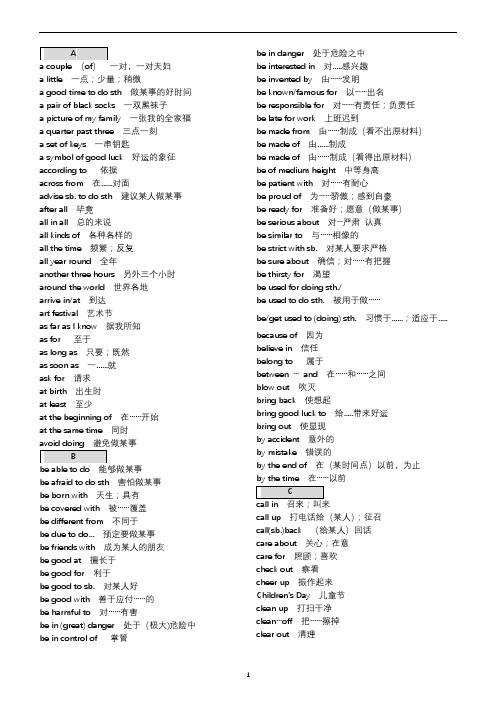
一对,一对夫妇
a little 一点;少量;稍微
a good time to do sth 做某事的好时间a pair of black socks 一双黑袜子
a picture of my family 一张我的全家福a quarter past three 三点一刻
a set of keys 一串钥匙
a symbol of good luck 好运的象征according to 依据
across from 在......对面
advise sb. to do sth 建议某人做某事after all 毕竟
all in all 总的来说
all kinds of 各种各样的
all the time 频繁;反复
all year round 全年
another three hours 另外三个小时around the world 世界各地
arrive in/at 到达
art festival 艺术节
as far as I know 据我所知
as for 至于
as long as 只要;既然
as soon as 一......就
ask for 请求
at birth 出生时
at least 至少
at the beginning of 在……开始
at the same time 同时
be able to do 能够做某事
be afraid to do sth 害怕做某事
be born with 天生;具有
be covered with 被……覆盖
be different from 不同于
be due to do... 预定要做某事

人教部编版初中英语中考78个易混易错单词短语句型梳理
一、英语常用易混淆单词/词组的区别用法
how much和how many的区别用法
how much和how many的区别:how much用来询问事物的数量,后接不可数名词;how many用来询问事物的数量,后接可数名词复数。
1.所修饰词不同
how much用来修饰不可数名词,表示数量,也可单独使用。
how many用来修饰可数名词的复数,它的句式是:How many+复数名词+一般疑问句+?
例句:
How much milk is there in the glass?
玻璃杯里有多少牛奶?
How many books are there on the desk?
有多少本书在桌子上?
2.用法不同
How much 表示多少钱,用来问价格。
例句:
How much is this dress?
这个连衣裙多少钱?
How many 表示多少,用来问数量。
例句:
How many apples do you have?
你有多少苹果?
in和on的区别用法
当我们表示某些东西被其他东西所包围时使用“in”这个词。而“on”用于描述物体被放置在其他物体上方或外部的情况。in可表时间,表地点,表手段、方法、材料。on表示时间、地点、方位等。
1.意思不同
in:prep.在 ... 里;在 ... 地方;在 ... 期间
on:prep.在 ... 之上
2.用法不同
in:in着重一段时间的过程,常用于重复动作或延续动作。in表示从现在时间算起推移到将来的一段时间之后,一般与将来时态连用。
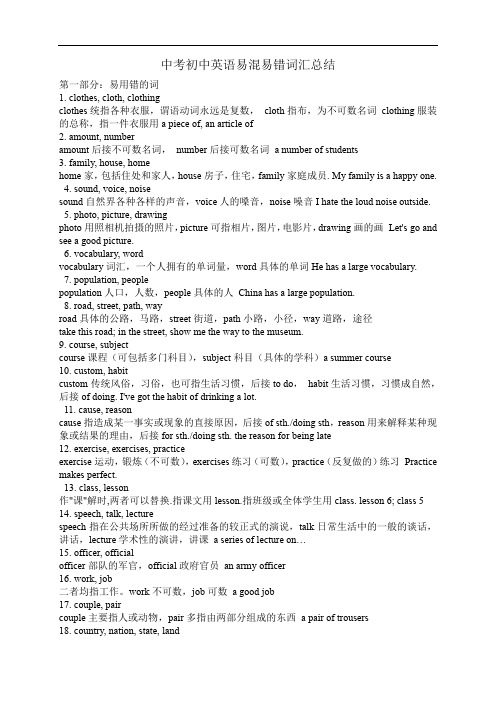
中考初中英语易混易错词汇总结
第一部分:易用错的词
1. clothes, cloth, clothing
clothes统指各种衣服,谓语动词永远是复数,cloth指布,为不可数名词clothing服装的总称,指一件衣服用a piece of, an article of
2. amount, number
amount后接不可数名词,number后接可数名词a number of students
3. family, house, home
home家,包括住处和家人,house房子,住宅,family家庭成员. My family is a happy one.
4. sound, voice, noise
sound自然界各种各样的声音,voice人的嗓音,noise噪音I hate the loud noise outside.
5. photo, picture, drawing
photo用照相机拍摄的照片,picture可指相片,图片,电影片,drawing画的画Let's go and see a good picture.
6. vocabulary, word
vocabulary词汇,一个人拥有的单词量,word具体的单词He has a large vocabulary.
7. population, people
population人口,人数,people具体的人China has a large population.
8. road, street, path, way
road具体的公路,马路,street街道,path小路,小径,way道路,途径


(完整版)人教版初中英语各单元短语知识
点汇总表
人教版初中英语各单元短语知识点汇总表(完整版)
Unit 1: Greetings
- How are you? 你好吗?
- Nice to meet you. 很高兴见到你。
Unit 2: Family
- Family members. 家庭成员
- Mother's Day. 母亲节
Unit 3: School Life
- School subjects. 学科
- School activities. 校园活动
Unit 4: Daily Routine
- Get up. 起床
- Go to bed. 上床睡觉
Unit 5: Hobbies
- Play sports. 进行体育运动- Listen to music. 听音乐
Unit 6: Festivals
- New Year's Day. 元旦节
- Chinese New Year. 中国新年
Unit 7: Travel
- Go on a trip. 去旅行
- Take photos. 拍照片
Unit 8: Shopping
- Go shopping. 购物
- Try on clothes. 试穿衣服
Unit 9: Weather
- Sunny day. 晴天
- Rainy day. 雨天
Unit 10: Emotions
- Happy birthday. 生日快乐
- Feel sad. 感到悲伤
Unit 11: Food and Drinks - Have breakfast. 吃早餐
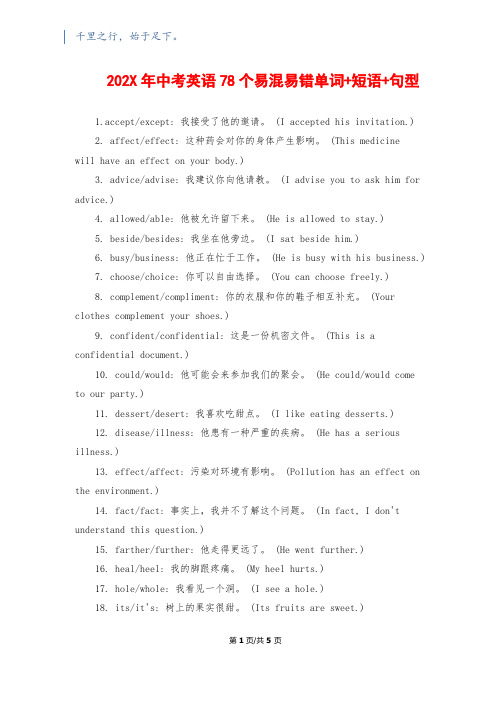
202X年中考英语78个易混易错单词+短语+句型
1.accept/except: 我接受了他的邀请。 (I accepted his invitation.)
2. affect/effect: 这种药会对你的身体产生影响。 (This medicine
will have an effect on your body.)
3. advice/advise: 我建议你向他请教。 (I advise you to ask him for advice.)
4. allowed/able: 他被允许留下来。 (He is allowed to stay.)
5. beside/besides: 我坐在他旁边。 (I sat beside him.)
6. busy/business: 他正在忙于工作。 (He is busy with his business.)
7. choose/choice: 你可以自由选择。 (You can choose freely.)
8. complement/compliment: 你的衣服和你的鞋子相互补充。 (Your clothes complement your shoes.)
9. confident/confidential: 这是一份机密文件。 (This is a confidential document.)
10. could/would: 他可能会来参加我们的聚会。 (He could/would come
to our party.)
11. dessert/desert: 我喜欢吃甜点。 (I like eating desserts.)

人教部编版初中七年级英语上册高频考点知识点归纳
人教部编版初中七年级英语上册高频考点知识点归纳
【重点单词】
good /gud/ adj. 好的
morning /'m?:ni?/ n. 早晨;上午
Good morning! 早上好!
hi /hai/ interj. (用于打招呼)嗨;喂
hello /h?'l?u/ interj. 你好;喂
afternoon /,a:ft?'nu:n/ n. 下午
Good afternoon! 下午好!
evening /'i:vni?/ n. 晚上;傍晚
Good evening! 晚上好!
how /hau/ adv. 怎样;如何
are /a:/ v. 是
you /ju:/ pron. 你;你们
How are you? 你好吗?
I /ai/ pron. 我
am /?m/ v. 是
fine /fain/ adj. 健康的;美好的
thanks /θ??ks/ interj.&n. 感谢;谢谢
OK /?u'kei/ interj.& adv. 好;可以
what /w?t/ pron.&adj. 什么
is /iz/ v. 是
this /eis/ pron. 这;这个
in /in/ prep. (表示使用语言、材料等)用;以English /'i?gli?/ n. 英语adj. 英格兰的;英语的in English 用英语
map /m?p/ n. 地图
cup /k?p/ n. 杯子
ruler /'ru:l?/ n. 尺;直尺
pen /pen/ n. 笔;钢笔
orange /'?rind?/ n. 橙子

八上units 7-8
考点1. believe 用法
教材例句:However, some scientists believe that although we can make .......(Unit 7 p53)
believe v 相信believe sb 相信某人
believe in sb 无条件信任
believe sb to be+n/adj 相信某人是..
It is believed that 人们相信...
believable adj 可相信的
考点2. agree用法
教材例句: However, they agree it may take hundreds of years. (Unit 7 p53)
agree v 同意赞成agree to do sth 同意做某事、
agree with sb 同意某人
agree on doing sth 双方同意做某事disagree v 不同意
agreement n 同意reach/come to an agreement on sth
考点3. look for/look up/find/find out用法
教材例句:....,these snake robots can help look for people under the buildings.(Unit 7 p53)
look for 寻找过程,强调动作
look up 查阅字典
find 找到.. 强调结果
find out 查明真相find out the truth
考点4. fill与full 用法
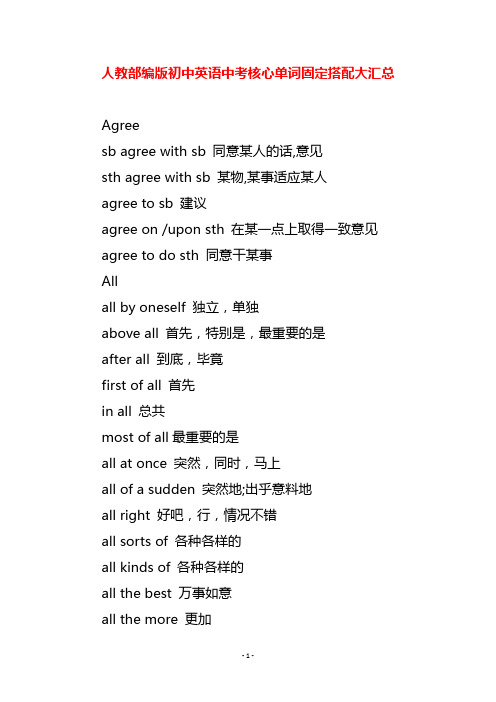
人教部编版初中英语中考核心单词固定搭配大汇总
Agree
sb agree with sb 同意某人的话,意见
sth agree with sb 某物,某事适应某人
agree to sb 建议
agree on /upon sth 在某一点上取得一致意见agree to do sth 同意干某事
All
all by oneself 独立,单独
above all 首先,特别是,最重要的是
after all 到底,毕竟
first of all 首先
in all 总共
most of all最重要的是
all at once 突然,同时,马上
all of a sudden 突然地;出乎意料地
all right 好吧,行,情况不错
all sorts of 各种各样的
all kinds of 各种各样的
all the best 万事如意
all the more 更加
all the same 尽管如此,仍旧(照样)all the year round 一年到头
AS
as…as…与……一样
as a matter of fact 事实上
as a rule 通常
as a result作为结果,因此
as a whole 总的来说
as if(as though) 好像
as follows 如下
as for 就……而言
as(so) long as 只要
as soon as 一……就
as soon as possible 尽快
as usual 象往常一样
as well 也,还
as well as 同……一样
might(may) as well 不妨
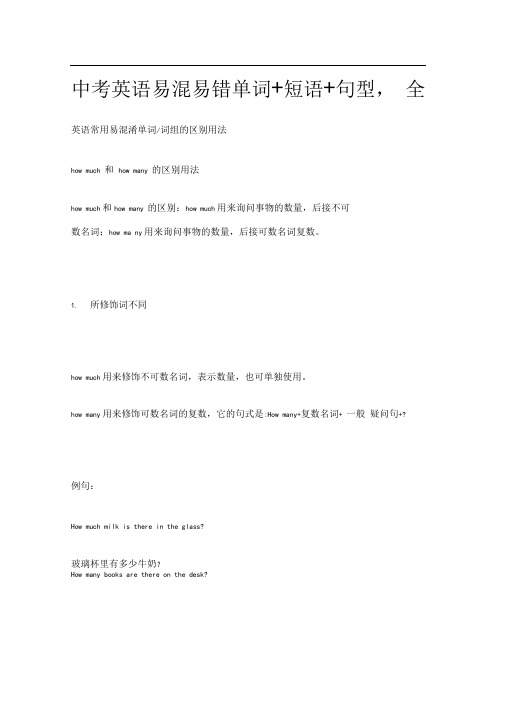
中考英语易混易错单词+短语+句型,全英语常用易混淆单词/词组的区别用法
how much 和how many 的区别用法
how much和how many 的区别:how much用来询问事物的数量,后接不可
数名词;how ma ny用来询问事物的数量,后接可数名词复数。
1.所修饰词不同
how much用来修饰不可数名词,表示数量,也可单独使用。
how many用来修饰可数名词的复数,它的句式是:How many+复数名词+ 一般疑问句+?
例句:
How much milk is there in the glass?
玻璃杯里有多少牛奶?
How many books are there on the desk?
有多少本书在桌子上?
2.用法不同
How much 表示多少钱,用来问价格
例句:
How much is this dress?
这个连衣裙多少钱?
How many 表示多少,用来问数量。
例句:
How many apples do you have?
你有多少苹果?
in和on的区别用法
当我们表示某些东西被其他东西所包围时使用“in ”这个词。而“ on ”用于描
述物体被放置在其他物体上方或外部的情况。in可表时间,表地点,表手段、方法、
材料。on表示时间、地点、方位等。
1.意思不同
in : prep.在…里;在…地方;在…期间
on : prep.在... 之上
2.用法不同
in : in着重一段时间的过程,常用于重复动作或延续动作。in表示从现在时间算起推移到将来的一段时间之后,一般与将来时态连用。

九年义务教育初中英语教学大纲中要求把握的各类单词+初中辞汇75组最容易
拼错的单词
一、冠词〔3个〕
1. a 一个〔件 / 只……〕
2. an 一个〔件 / 只……〕
3. the 这;那个;
那;那个
二.连词〔24个〕
1. after 在……以后
2. and 和;又
3. as 像……一样;犹如;因为
4. because 因为
5. before 在……之前
6. but 可是
7. if 若是;假使;是不是;是
不是 8. neither 也不
9. nor 也不 10. or 或;仍是;否那么 11. since 从……以来;……以后
12. that 既然;由于;〔引导宾语从句等〕 13. though 尽管 14. till 直到;直到……为止
15. until 直到;直到……为止 16. when 当……的时候 17. whether 是不是
18. while 在/当……的时候;和……同时 19. than 比 20. so 因此;因此
21. both…and… 两个都;既……又…… 22. not only…but also… 不但……而且……
23. either…or… 或……或……;不是……确实是…… 24. neither…nor… 既不……也不……
三.介词〔37个〕
1. about a. 在遍地;四处 b. 关于
2. after a. 在……以后
b. 在……后面
3. along 沿着 ; 顺着
4. as 作为 ; 看成
5. among a. 在……中间
b. 在(三者或三者以上)之间